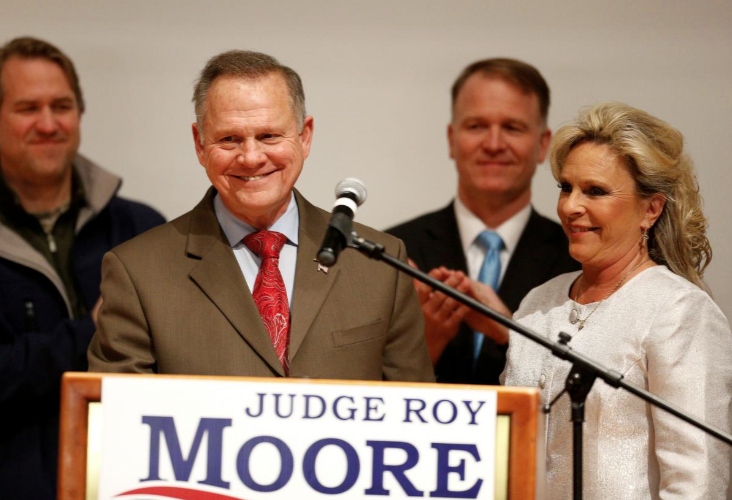What does Roy Moore's defeat say to evangelicals?
In the normal way of things, an election for a random US Senate seat would be of very little interest in the UK. But it's surprising how many of my Christian friends have breathed a little sigh of relief at the victory of Doug Jones over Roy Moore in Alabama. Nothing to do with us, you might say – but that's not quite true.
Roy Moore's most loyal supporters were evangelicals. The judge who spoke out against abortion, 'sodomy and perversion', who warned against America facing the 'judgment of God' and was slapped down for refusing to remove a monument to the 10 Commandments on public land was their man. A wave of allegations about sexual misconduct and Moore's penchant for teenage girls did absolutely nothing to dent their faith – in fact, a pre-election poll by JMC analytics reported by The Hill found that 34 per cent said the accusations would make no difference to their vote, while 37 per cent said they would be more likely to vote for Moore because of them.

This was borne out on the day, with an early exit poll reported by NBC showing evangelicals overwhelmingly – 72 per cent – believing allegations of sexual misconduct against Moore are false (44 per cent said they were probably false, 28 per cent definitely). That this is slightly less than the figure for Republican voters overall is only a crumb of comfort.
Let's be clear: we don't know the truth, and won't until and unless these allegations have been tested in the courts. But the refusal of evangelicals to countenance even the possibility that their man is a wrong 'un is deeply depressing. It portrays this brand of Christianity as locked into a conspiracy worldview in which questioning a Christian's behaviour is an attack on Christ. It makes it look as though the GOP comes before the gospel. It lines up evangelicalism alongside the abusers rather than the abused.
It makes evangelicals look like horrible people. It trashes the brand – and that's why it matters to those of us on the other side of the pond, because it's our brand too.
Let's be honest – we have our equivalents over here as well, with Christian leaders and organisations willing to defend the indefensible because of their allegiance to the tribe rather than to Christ. But the Roy Moore case felt different. It held evangelicals up to the harsh light of public opinion, and the public didn't like what it saw. The vote for Doug Jones was a rejection of politicised evangelicalism. The danger is that people think that's the only kind there is – and evangelicalism is a world-wide brand, not just a US one. If it's been trashed in Alabama, that has much wider consequences.
So let me say this: I don't believe that, even in the US, most evangelicals have been politicised to the extent that they'll put party before faith. I think they're decent people who believe a personal relationship with Jesus Christ is the most important thing in anyone's life. I think they believe that changing the world starts with changing people's hearts, and that churches full of committed and faithful believers are the best engine for mission on every level that there is. I resist the way they're characterised as obstructionist, obscurantist, hateful fundamentalists. Most of them really aren't.
There's a debate at the moment over whether, because of just such instances as the Roy Moore case, the word 'evangelical' has lost any value it ever had, and we should stop using it as an identifier. I'm not sure, but I sympathise with the view. It originated as a way of expressing a kind of spirituality; now it's the badge of a party, weaponised to define who's in and who's out.
If we're to use it constructively in future, we have to define it in opposition to the forces that drove conservative Christians to vote for Roy Moore in such numbers. Perhaps it is too late for the brand. But it's never too late for the gospel. Learning to speak of Christ with passion and integrity in their own time is something every generation needs to learn again.
Follow Mark Woods on Twitter: @RevMarkWoods











